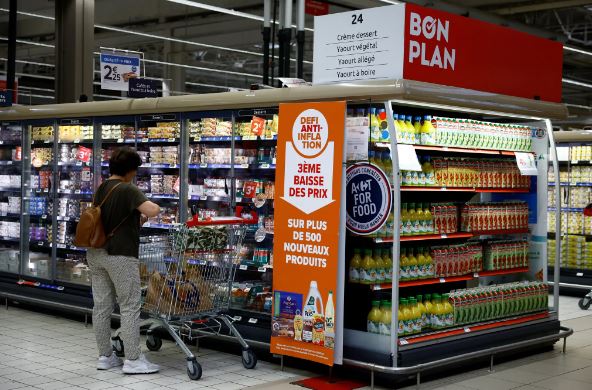While official statistics suggest a decline in inflation across Europe, consumers grappling with soaring prices at the supermarket tell a different story. In a bold move, France’s largest food retailer, Carrefour, has decided to stop selling PepsiCo products, citing “unacceptably” high prices for consumers. The decision marks a significant escalation in the ongoing efforts by French retailers to name and shame brands that are not adjusting prices despite the easing inflation.
Carrefour, a global retail giant with 3,440 supermarkets in France, prominently displayed posters throughout its outlets, declaring the cessation of PepsiCo product sales due to an “unacceptable price increase.” The affected products include Lay’s potato chips, Pepsi and 7-Up soft drinks, as well as Doritos, Quaker cereals, and other PepsiCo items. A spokesperson for PepsiCo acknowledged ongoing discussions with Carrefour, expressing a commitment to finding a resolution to ensure product availability.
This move is part of a broader campaign, encouraged by the French government, aimed at pressuring manufacturers to lower food costs persistently affecting families. The initiative also seeks to expose brands practicing shrinkflation, a tactic where manufacturers reduce package sizes while maintaining or raising prices.
Despite a notable decline in inflation in the eurozone, reaching a two-year low in November, food price inflation remains stubbornly high. In France, inflation in December rose at an annual rate of 3.7 percent, down by a third from the previous year. However, basic food items in a typical basket, ranging from pasta to yogurt, are still 7 percent higher than a year ago.
Manufacturers have justified the rising costs by citing below-average profit margins in Europe, driven by high input costs. The French government, led by President Emmanuel Macron, has been urging manufacturers and retailers for over a year to reduce prices. Macron’s goal is to witness a minimum 5 percent reduction in food prices, reflecting the decline in raw material costs emerging after a year of record-high prices, largely influenced by geopolitical events such as Russia’s invasion of Ukraine.
France has been proactive in pressuring manufacturers and retailers, pushing for earlier price negotiations between retailers and manufacturers. Macron’s administration has also proposed a shrinkflation labeling campaign at the European Union level, aiming to compel food retailers to disclose information about shrinkage on packaging. Carrefour has already taken steps to mark its shelves with signs detailing shrinkage levels and the impact on consumer prices.
The decision to cease selling PepsiCo products aligns with the broader objective of bringing large companies to the negotiating table and achieving quicker price decreases. Macron emphasizes the urgency of addressing the economic strain on households, stating, “It is intolerable to see so many households having to make choices about essential goods.”
Many global consumer goods companies have implemented double-digit percentage price hikes in the past year, attributing them to increased costs of ingredients and labor. While consumers grapple with inflation, companies often report expanding profits as they sell fewer items at higher prices. Recent reports indicate that consumers are becoming more selective, orienting towards value, as they navigate the impact of inflation and high-interest rates.
The move by Carrefour in France reflects a broader momentum in Europe to tackle the cost-of-living crisis persisting amidst an economic slowdown. Unlike the U.S. economy, which has been expanding, Europe faces challenges of high-interest rates and the lasting impact of the energy crisis triggered by Russia’s war in Ukraine. Governments in Italy and Greece are also taking steps to address rising food prices, indicating a continent-wide effort to alleviate the burden on consumers.
While the decision by Carrefour to stop selling PepsiCo products sends a clear message to manufacturers, the broader success of the campaign and its impact on consumer prices will unfold in the coming months. As retailers across Europe grapple with the complex dynamics of inflation, manufacturers are under increasing pressure to align their pricing strategies with the goal of providing relief to households facing economic challenges.

